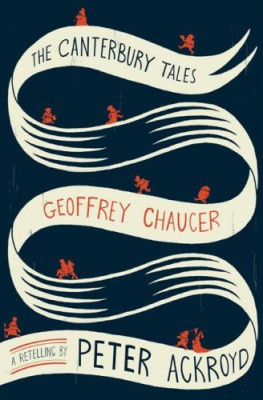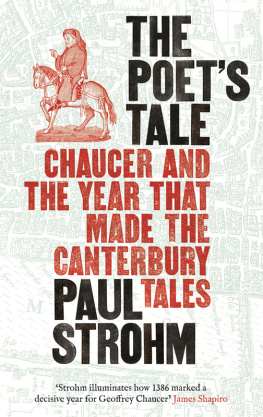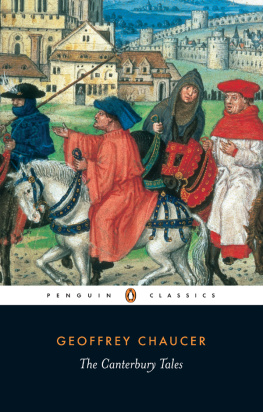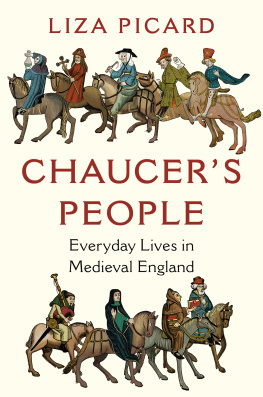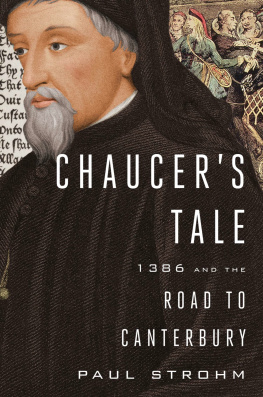PeterAckroyd
TheCanterbury Tales Retold
TheGeneral Prologue
Herebygynneth the Book of the Tales of Caunterbury
Whenthe soft sweet showers of April reach the roots of all things, refreshing theparched earth, nourishing every sapling and every seedling, then humankindrises up in joy and expectation. The west wind blows away the stench of thecity, and the crops flourish in the fields beyond the walls. After the waste ofwinter it is delightful to hear birdsong once more in the streets. The treesthemselves are bathed in song. It is a time of renewal, of general restoration.The sun has passed midway through the sign of the Ram, a good time for thesinews and the heart. This is the best season of the year for travellers. Thatis why good folk then long to go on pilgrimage. They journey to strange shoresand cities, seeking solace among the shrines of the saints. Here in Englandmany make their way to Canterbury, and to the tomb of the holy blissful martyrThomas. They come from every shire to find a cure for infirmity and care.
Itso happened that in April I was lodging at Southwark. I was staying at theTabard Inn, ready to take the way to Canterbury and to venerate the saint.There arrived one evening at the inn twenty-nine other travellers and, much tomy delight, I discovered that they were all Canterbury pilgrims. They came fromvarious places, and from various walks of life, but they all had the samedestination. The inn was spacious and comfortable enough to accommodate us all,and we were soon at ease one with another. We shared some ale and wine, andagreed among ourselves that we would ride together. It would be a diversion, amerry journey made in good fellowship. Before the sun had gone down, we haddetermined to meet at dawn on the following day to make our way along thepilgrims' road.
Beforewe begin our travels, however, I want to introduce you to the men and women whomade up our company. If I describe their rank, and their appearance, you mayalso acquire some inkling of their character. Dress, and degree, can be tokensof inward worth. I will begin with the Knight.
TheKNIGHT, as you might expect, was a man of substance and of valour. From thestart of his career as a warrior he had fought for truth and honour, for freedomand for dignity. He had proved himself in warfare in many lands; he had riddenthrough the territories of the Christians and the countries of the infidel, andhad been universally praised for his military virtues. He had been present whenAlexandria was won from the Turks; he had taken the palm of valour from all theknights of Prussia; he had mounted expeditions in Russia and Lithuania. He hadproved himself in Granada and Morocco and Turkey. Where had he not travelled,and where had he not been victorious? He had fought fifteen battles, and takenpart in three tournaments. These exploits were not for love of glory, however,but for love of Christ. Piety guided his sword. He considered himself no morethan an instrument for God.
Thatis why he was, despite his reputation for bravery, modest and prudent. Inappearance he was meek as any maid, and no oath or indecency ever passed hislips. He was never insolent or condescending. He was the very flower ofchivalry, in this springtime of the year; he was a true and noble knight. Doyou see him in front of you? He did not wear the robes of office but a tunic ofcoarse cloth that would have better suited a monk than a soldier; it wasdiscoloured, too, by the rust from his coat of mail. He had a good horse but itwas not festooned with bells or expensive cloths. It was the horse of apilgrim. He told me that he had come from an expedition in order once more topledge his faith. He asked me about myself then - where I had come from, whereI had been - but I quickly turned the conversation to another course.
Hewas travelling with his son, a young SQUIRE, a lusty and lively young man whoalso aspired to knighthood. He was of moderate height, but he was strong andagile. It is said that the hair is a token of vitality; the more virile a manis, the more hair he will have. His was knit in tight blond curls that floweddown his neck and across his shoulders. He was about twenty years of age, andhad already taken part in cavalry expeditions in northern France. In that shorttime he had made a good impression on his comrades, but the only person hereally wished to impress was a certain lady of his acquaintance. I did notdiscover her name. His tunic was embroidered with flowers, white and red andblue; it was as if he had gathered up a sweet meadow and placed it upon hisshoulders. He wore a short gown, with wide sleeves, as suited his rank. He rodewell and easily with the grace of a natural horseman. He was always singing, orplaying the flute. He wrote songs, too, and I learned that he could joust, andwrite, and draw, and dance. All the finer human accomplishments came naturallyto him. In his company it was always May-time. He had good cause for highspirits. He was so passionately in love that he could scarcely sleep at night;he enjoyed no more rest than a nightingale. Yet he never forgot his manners. Hehad been instructed in all the arts of courtesy, and carved the meat for hisfather at the table. When he spoke to me, he took off his hat; he did not glancedown at the ground, but looked at me steadfastly in the face without moving hishands or feet. These are good manners.
TheKnight in fact had only one servant with him, a YEOMAN, who was dressed in thecustomary hood and coat of green cloth. Green is the colour of faithfulness andservice. He carried under his belt a sheaf of dainty peacock arrows, keen andbright, while in his hand he carried a bow. He knew how to take good care ofhis equipment, because the feathers were upright and the arrows flew to theirtarget. His hair was closely cropped, and his visage was as brown as a smokedham. On his arm he wore a glittering arm-guard, and by his right side hung asword and small shield. On his left side was a dagger in its sheath, its handlerichly ornamented and its blade exceedingly sharp. This was a young man readyfor combat. Yet he had a silver badge of Saint Christopher, the saint oftravellers as well as archers, shining on his tunic. I guessed that thisYeoman, when not dressed for battle, worked as a forester on the Knight'sestates. He had a horn hanging at his hip from a broad belt of green. 'I haveoften seen such a horn,' I told him, 'in the woods and forests.'
'Yes,'he said, 'it rouses the buck.' Then he rode on. He was not a chatterer.
ThePRIORESS, of course, rode before him. She was an exemplary nun who put on noairs of excessive piety. She was amiable and modest, and in the course of ourpilgrimage she occasionally invoked the name of Saint Eligius; since he is thepatron saint of horses and of smiths, she must have been wishing for good speedand a comfortable journey. I should have asked her. Her name was MadameEglantine, and she was as fragrant as any sweetbriar or honeysuckle. She sangthe divine service with perfect pitch, and intoned the sacred verses in a deftand sonorous manner. She spoke French elegantly enough, although her accent wascloser to Bow than to Paris. What does it matter if we do not speak the exactlanguage of the French? They are no longer our masters. English is even spokenin the parliament house now. The table manners of the Prioress were of thebest. She never let any meat fall from her lips, and she did not dip her handstoo deeply into the sauce; not a drop of it fell upon what I must call, if shewill forgive me, her breasts. She wiped her lips so carefully that not onesmudge of grease was to be found on the rim of her cup, after she had drunkfrom it, and she was careful never to grab at the food on the table. She knewthat the manners of the table reflect the manner of a life. She deportedherself very well, in other words, and was amiable and pleasant in all of herdealings. She tried very hard to imitate courtly manners, and remained verydignified on all occasions; she deemed herself to be worthy of respect and, asa result, came to deserve it.
Next page
